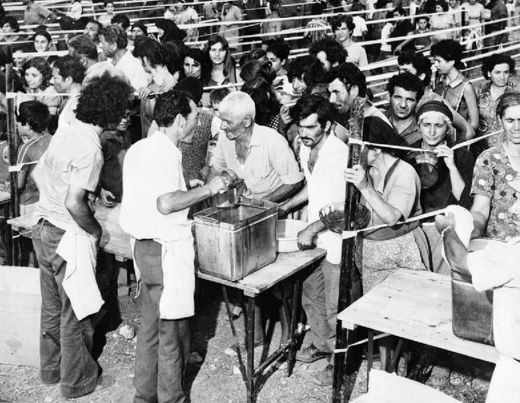
For the people of Cyprus, July 20, 1974, is a day that will always live in infamy. This was the day that the Turkish military, using an attempted right-wing coup as a pretext, invaded the island nation. Nobody, including the great imperial powers, the U.S. and Great Britain, tried to stop or hinder them or stand in their way
On July 15 of that year the right-wing Cypriot terrorist organization EOKA-B staged a coup and attempted to murder the elected president, Makarios III. They failed and the coup government collapsed in only eight days, but this pretext along with the fanatical anti-Turkish hate rhetoric of the Cypriot right was all the pretext that the Turkish army needed.
In subsequent weeks, even after the collapse of the coup, the Turkish army expanded and consolidated its aggression, eventually coming to occupy more than one third of Cyprus’ territory, even as the great powers stood by. The Turkish army continues to this day to occupy this ill-gotten territory including part of the capital, Nicosia, making it the only divided city in Europe.
During the invasion, over 200,000 people were driven from their homes, becoming refugees in their own land. Thousands more disappeared, their fates unknown even until today. Many Cypriots who did not flee from the Turkish Army remain “enclaved” in the occupied regions, quasi-prisoners in their own country.
While Turkey bears the ultimate and direct responsibility for the present state of affairs, Cyprus was subject to the meddling of the imperial powers for a long time before that.
In 1960, after suffering many years under the British colonial yoke, Cyprus achieved its independence. From the start, however, it was victimized by the great powers. Right out of the box the new nation was saddled with a constitution that was set up by power brokers in Washington DC, London and Athens.
This rotten setup let Turkey in the door by making them party to the agreement although they had renounced all interest in Cyprus following World War I. In the end, the leader of the Cypriot independence movement, Makarios, was forced to sign the ill-fated constitution, pressured mainly by Britain but also by the U.S. and Greece.
In the years preceding the invasion, right-wing nationalist forces in both the Greek Cypriot and Turkish Cypriot communities, wittingly or unwittingly doing the dirty work for imperialism, fought to drive the Cypriot people apart. Indeed the right-wingers, in their campaign against all those who called for unity, ended up murdering more members of their own communities than those of the supposed “enemy” community.
The nationalists should have known whose work they were doing. There is plenty of evidence that imperialism always favored a Cyprus that was partitioned between NATO members Greece and Turkey.
From the time of its founding up until the present, Cyprus was non-aligned, thus was out of the complete dominance of imperialism, out of the grasp of NATO.
Imperialism, for its part, always figured that a divided nation would more easily fall into the clutches of NATO, or, barring that, a NATO member could maintain de-facto control of a part of the island, which, from imperialism’s view, was almost as good.
The British for example, had an interest in maintaining the large military bases that the flawed constitution granted them. Thus they had an interest in keeping Cypriots focused on the more pressing question of unifying their nation rather than worrying about the presence of the bases.
In the end, although the right was defeated, Makarios survived and the left on Cyprus emerged stronger than ever, imperialism still got some of what it wanted – de-facto partition, allowing NATO to partially get its claws on Cyprus thanks to the Turkish army.
The pattern for what occurred was set one year earlier with the right-wing coup against Salvador Allende in Chile. We now know that this outrage was the brainchild of Henry Kissinger who likewise is blamed for being the brains behind the similar events on Cyprus. Although the Cypriot and Greek ultra-right and the Turkish militarists were stage front in this tragedy it was Kissinger who was the stage manager.
This story is also detailed in some excellent English language works. First off there is a chapter on Cyprus in C. Hitchens’s book, “The Trial of Henry Kissinger.” Also, the entire situation is covered in greater detail in “The Cyprus Conspiracy” by Brendan O’Malley and Ian Craig, and in “Cyprus: A Modern History” by William Mallinson.
The illegal Turkish occupation has now gone on for some 40 years, and progressive minded people the world over should take a keen interest. Even now, years later, NATO is still lusting after Cyprus.
Photo: Cypriot refugees Akhna 1974, Public Domain.

MOST POPULAR TODAY


Zionist organizations leading campaign to stop ceasefire resolutions in D.C. area

High Court essentially bans demonstrations, freedom of assembly in Deep South

Afghanistan’s socialist years: The promising future killed off by U.S. imperialism

Communist Karol Cariola elected president of Chile’s legislature






Comments